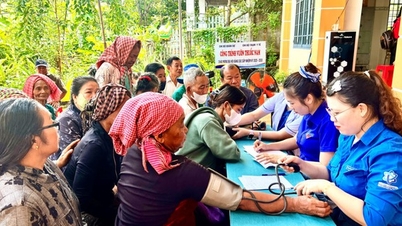With advances in treatment, people with HIV can now live longer and healthier lives. However, living with HIV for a long time brings special challenges as we age.
- 1. The impact of HIV on physical health in aging
- 2. The impact of HIV on mental and emotional health
- 3. Aging and HIV: An inseparable process
- 4. Strategies to maintain quality of life for people with HIV as they age
In fact, many people have lived with HIV for 20 years or more. This proves that it is entirely possible for people with HIV to live long and healthy lives. However, the aging process for people with HIV is not as simple as for people without HIV.
1. The impact of HIV on physical health in aging
People with HIV, especially those over 50, often face more chronic conditions than those who are not infected. According to the US Centers for Disease Control and Prevention (CDC), more than half of people with HIV aged 50 and older have at least one chronic condition unrelated to AIDS, such as cardiovascular disease, diabetes, osteoporosis, etc.
Antiretroviral therapy (ART) helps control the virus, but it does not stop the inflammation caused by HIV, so it can increase the risk of chronic diseases not related to AIDS. In addition, people with HIV are at higher risk of problems such as high blood pressure, impaired liver and kidney function, poor oral health and weight changes.
Maintaining a healthy lifestyle, including a healthy diet, regular exercise, and regular health check-ups, is important to control the above risk factors.

Regular health check-ups help detect health problems early and provide timely intervention for people infected with HIV.
2. The impact of HIV on mental and emotional health
Living with HIV for a long time can affect your mental and emotional health. Depression, anxiety, loneliness, and guilt are common problems for people with HIV, especially as they age. According to the CDC, maintaining good mental health is important for living well with HIV.
Joining support groups, seeking help from mental health professionals, and maintaining positive social relationships can help alleviate these negative feelings. Additionally, self-acceptance and self-love are important factors in maintaining good mental health.
3. Aging and HIV: An inseparable process
Aging in people with HIV is not simply a combination of age and infection. It is a complex process, influenced by many factors such as treatment regimen, lifestyle, social support and mental health. Understanding the impact of HIV on aging is important to develop effective prevention and treatment strategies.

Regular exercise helps improve overall health for people with HIV.
4. Strategies to maintain quality of life for people with HIV as they age
To maintain quality of life as they age, people with HIV need to:
- Adherence to treatment regimen: Full adherence to antiretroviral (ARV) medications helps control the virus and reduces the risk of related diseases.
- Regular health check-ups: Regular health check-ups help detect health problems early and provide timely intervention.
- Maintain a healthy lifestyle : A reasonable diet, regular exercise and adequate sleep help improve overall health.
- Emotional support: Joining support groups, seeking help from mental health professionals, and maintaining positive social relationships help reduce stress and feelings of loneliness.
- Accept and love yourself : Accepting and loving yourself helps improve mental and emotional health.
Aging for people living with HIV is a challenging but hopeful journey. With advances in treatment and community support, people living with HIV can live long and healthy lives. Understanding the impact of HIV on aging and adopting strategies to maintain quality of life are important to living well with HIV throughout life.
See more popular articles:
Source: https://suckhoedoisong.vn/song-khoe-voi-hiv-hieu-va-ung-pho-voi-qua-trinh-lao-hoa-169251025202148112.htm





![[Photo] Prime Minister Pham Minh Chinh receives Lao Minister of Labor and Welfare Phosay Sayasone](https://vphoto.vietnam.vn/thumb/1200x675/vietnam/resource/IMAGE/2025/11/11/1762872028311_dsc-2246-jpg.webp)

































































































![Dong Nai OCOP transition: [Article 3] Linking tourism with OCOP product consumption](https://vphoto.vietnam.vn/thumb/402x226/vietnam/resource/IMAGE/2025/11/10/1762739199309_1324-2740-7_n-162543_981.jpeg)








Comment (0)